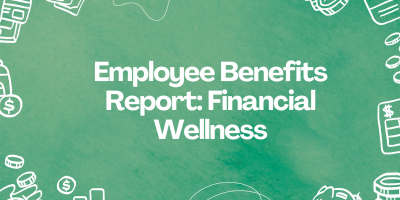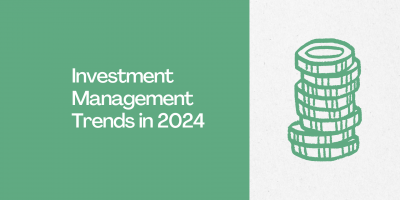
What Does Legal Insurance Cover?
With the growing popularity of legal insurance plans, particularly as employee benefits, legal protection through group legal plans is rapidly becoming the norm due to its numerous advantages.

Personal finance plays a critical role in our lives and overall well-being. What we earn, spend, and save is woven into all aspects of our lives. Think about the amount of stress it causes when your finances go awry or you have to make a significant financial decision.
As the past few years have challenged our workplaces, economy, and finances, many employees were caught unprepared with no emergency savings or financial plans. To address increased economic insecurity and stress among employees, many employers turned to financial wellness programs as a solution.
Approachable and relevant financial education is also suitable for company culture, employee health, and business.
The availability of HSA, 401(k), FSA, and others, leaves employees on a steep learning curve to understand the complexities of their benefits plans and how to allocate dollars to these products.
With these factors becoming more lucent, employers are stepping up to help improve their employees’ financial wellness.
Financial wellness is a state of feeling secure in your financial future and being able to meet ongoing and future financial obligations. An individual reaches a state of financial well-being when they have:
Beyond the basic definition, financial wellness can look and feel very different to an individual based on age, economic status, and other factors (cultural, geographical, etc.)
There are also a variety of “stages” that an individual can be at in their financial journey.
Beginning with the essential elements of understanding their financial state and being able to withstand an emergency, all the way to the more established position of financial planning, the needs of an individual can be a linear progression.



Given the array of personal finance needs in the market, a myriad of vendor solutions and innovations are developing rapidly to meet the growing demand in the employer space.
But how do you, as an employer, create and implement a successful financial wellness program?
And what does success mean?
This Financial Wellness Buyer’s Guide aims to provide employers with the basic information needed to coordinate the selection of a provider for your financial wellness program.
This guide is designed to help you navigate the buying process and enable your organization to:
While diving headfirst into demos and pricing proposals is tempting, it’s crucial to spend time analyzing and documenting your employee’s needs. The amount of time you spend preparing directly correlates to your new vendor’s ultimate success.
Before considering the ROI of a financial wellness program, consider how it would align with your organization’s goals, especially with your talent goals. Outline what you want financial wellness to realize for your company. Every company is unique, so there is no one-size-fits-all solution that can work for any organization.
If possible, consider running an anonymous survey or focus group to find out what your employees want in a program. While most employees have apprehensions about sharing their personal financial information, an anonymous survey is a great starting point.
Here are some questions you can include:
Gathering information from various sources can help narrow the broad scope of benefits you can offer.
Methods of information gathering:
For example, you can work with the 401(k) administrator or other record keepers to do a demographic analysis, allowing you to identify target audiences that could benefit most from financial wellness services.
You can also review 401(k) loan data, hardships, wage garnishments, and so on to provide insight into your “lowest hanging fruit.”
Evaluate and map out your total financial benefits offering — from your retirement offering and health insurance to discount or banking services.
Evaluate those offerings, align them with your wellness goals and fill in any gaps with other solutions.
By re-evaluating your current solutions and knowing which ones are unutilized, you can replace them with more focused alternatives.
You will inevitably face challenges and obstacles when implementing a financial wellness program.
The cost of developing this program is one of the most significant challenges.
Other challenges include the potential liabilities tied to your fiduciary responsibilities and employees’ reluctance to participate in the program. It is best to identify potential setbacks and mitigate potential threats to successful implementation.
After gathering information on which areas your employees need financial assistance, you can start identifying which vendors you want to look into. It’s time to meet the vendors!
Keep the following in mind as you’re evaluating options:
Specific programs only address one demographic or benefit (for example, only student debt or retirement), while others provide a full spectrum of benefits.
Keep your priorities top of mind when considering the breadth of offerings, then choose a solution that offers the benefits you will need for your ideal program.
A vendor’s motivation is fundamental in this industry because you want the help that you provide to your employees to be “independent and unbiased” financial advice, and you don’t want employees to be sold on additional or unnecessary products and services.
Historically, the financial wellness market has been primarily driven by the need to give everyday people access to financial advice they can trust. Therefore, many vendors distinguish that their services are free from any underlying motivations to sell additional services/products. Understanding a vendor’s background and ownership structure can provide insights into their motivations.
The professional staff’s education and experience who guide your employees also matter. Some vendors require that all their counseling staff have the Certified Financial Planner (CFP) designation.
Other vendors purport that this high degree of expertise is not necessary for the typical customer.
They believe that most people just need guidance on getting out of debt, developing a budget, or building emergency savings – all those things can be handled by a trained financial coach or someone with an Accredited Financial Advisor (AFC) designation.
There are many types of firms providing a variety of financial wellness services.
When you’re just starting out, there are some ways to start your research:
Tip: If you find a provider you like, ask them who their key competitors are.
Financial wellness services should be seen as an extension of your employer’s overall benefits package.
Do you know if the provider will assist with onboarding new hires?
How will they integrate with your existing EAP arrangements?
Do they provide help with financial crises (referral services, counseling)?
Aside from the desired services and employee experience, finding the right financial wellness vendor-partner isn’t much different than other HR benefit vendor selections. Strategic alignment is critical because leadership, communications, and culture all come into play.
Take the time to get to know the potential partners and understand what it will be like working together throughout the year. Key attributes to consider about the vendor you select include:
Most vendors charge a per-employee-per-month (PEPM) fee for access to their digital platform, health literacy library, or other stand-alone resources. There may be a one-time implementation and setup fee, as well.
Financial coaching is usually an additional, separate fee, with a variable cost range (either PEPM or Per Participant), primarily dependent on how the service is delivered (online chat, phone, in-person) and the expertise of the professional staff.
Specialty niches (i.e., student loan repayment, short-term loans, and investment advice) can have more unique pricing structures.
Be sure to discuss pricing plans during your demo.
Unfortunately, many financial programs focus on higher-income individuals and emphasize retirement savings.
While there is nothing wrong with supporting your employees to plan for the future, many are facing urgent financial issues today. Ideally, it would be best to look for a financial wellness program with options for short-term and long-term financial goals.
Finally, you want to consider the medium through which your financial wellness services are offered.
Take into account that the resources and materials are tailored and available to the age and demographics of your employees, and avoid ones that are only accessible via one medium.
To maximize engagement, it’s best to offer various options that will attract different types of people. Some people prefer to engage from the privacy of their homes, while others are comfortable having these conversations (with discretion) at work.
Some prefer to work one-on-one with a live person, while others prefer to do so independently online. The more options you can provide, the better it will be to engage most of your workforce.
|
Desired Product- Specific Services |
Description |
|
Standard
Financial Wellness Services Offered |
Financial education Cash flow management and budgeting Personal and household budgeting Personal financial assessment Consumer credit
building Consumer debt
reduction One-on-One
support from a coach or counselor Student loan
repayment management Emergency and
short-term savings Spending
behaviors and consumer attitudes Financial
crisis management (dealing with collections, extended unemployment, and even
certificates required for filing bankruptcy) |
|
Program
Features Add-ons |
Calculators Automated cash flow management Financial goal setting & progress tracker Social support Mobile app |
|
Product-Specific
Capabilities |
Benefits portal - An online, interactive platform that
guides employees through financial topics relevant to them Total rewards
platform (e.g., compensation, equity, insurance, retirement contributions,
PTO, voluntary benefits) Financial
assessment software Cashflow
tool Budgeting
tool Debt management
counseling Retirement
savings tracking Credit account
tracking Bankruptcy
support Credit report
review Foreclosure
prevention Homebuying
counseling Short-term
lending solution Student loan
repayment support On-demand pay
solution Dependent's
eligibility coverage Connections to
local organizations and agencies in the local community to help employees
address specific needs. 24-hour
availability with guaranteed consultation within 24/72 hours Advisors
possess Certified Financial Planner (CFP) designation |
After a thorough discovery and shopping process, you’re ready to move forward with a decision!
Congratulations!
Key milestones here include:
Before you sign any contracts, you may want to verify that the company has a good reputation.
This includes:
Of course, you’re going to notify the vendor to whom you’ve awarded your business, but be sure also to take time to provide feedback to the vendor candidates who didn’t win your business.
They have invested time and resources into your project, and hearing some details about the decision is good practice and will only help them improve.
Ensure you review the contract with the vendor before signing it and understand the pricing and any additional fees you may be charged. Your list of needs and requirements may look different during the selection process, so revising the pricing plan is essential.
When is best to introduce the benefit to the workforce?
The consensus indicates that off-cycle from annual enrollment is the best time to incorporate a new benefit to manage for the HR staff and grab employees’ attention outside of the busy yearly enrollment period.
From there, promoting the new benefit will be an ongoing endeavor to ensure that employees are aware of the benefit and take advantage of it.
Incentive designs are becoming more common to help with engagement as well.
You have finally reached the final step to implementing and starting your financial wellness program. While it may seem like the hard work is finished, the truth is that this phase is critical to a successful project.
These steps will help things stay on track:
In terms of implementation, lead times vary based on the type of service and level of portal customization.
Some digital tools and stand-alone resources are so turnkey that they can go live within a month. However, a more comprehensive program will typically take 90 days if there are complex customizations or integrations.
Before you even launch this benefit, get your employees excited about it!
This way, they will be more inclined to use it once it’s fully established. Keep them informed about the program you are building, make announcements, do demos, and answer any questions.
A comprehensive communication plan is essential for program participation, employee buy-in, and program success.
No technology implementation is without issue and prepare for problems to pop up during implementation and beyond. Accept that things will go wrong and have realistic expectations and goals.
Ideally, you should adopt a multi-channel approach when promoting your new vendor. Apart from the common promotion approaches like workshops, webinars, and newsletters, you can include more innovative solutions like automated alerts or email campaigns.
Financial wellness is a hot topic these days – and for a good reason!
Financial stress damages employees’ productivity, engagement, and attendance; therefore, a financial wellness program’s benefits are plentiful for your employees and your company.
Shortlister has gone through a process to identify and onboard all the key players in the space into our database, allowing us a unique insight into this market.
If you need assistance understanding the best vendor option for your needs or streamlining the process of comparing vendors, we are in the best position to help you do so.
Disclosure: Some of the products featured in this blog post may come from our partners who compensate us. This might influence the selection of products we feature and their placement and presentation on the page. However, it does not impact our evaluations; our opinions are our own. The information provided in this post is for general informational purposes only and should not be considered as legal, tax, accounting, or investment advice. For advice on specific issues, please consult with a qualified professional.
Browse our curated list of vendors to find the best solution for your needs.
Subscribe to our newsletter for the latest trends, expert tips, and workplace insights!

With the growing popularity of legal insurance plans, particularly as employee benefits, legal protection through group legal plans is rapidly becoming the norm due to its numerous advantages.

In an era where 60% of Americans live paycheck to paycheck, companies are increasingly recognizing the urgent need for comprehensive financial wellness programs.

From emerging technologies and the wealth transition to a shift in growth and tax strategies, here are the most significant investment management trends shaping 2024.

What is the cost of employee financial stress? For employers, economic hardships usually mean reduced efficiency, increased absenteeism, and turnover rates. But for employees, the situation can be even more challenging.
Used by most of the top employee benefits consultants in the US, Shortlister is where you can find, research and select HR and benefits vendors for your clients.
Shortlister helps you reach your ideal prospects. Claim your free account to control your message and receive employer, consultant and health plan leads.